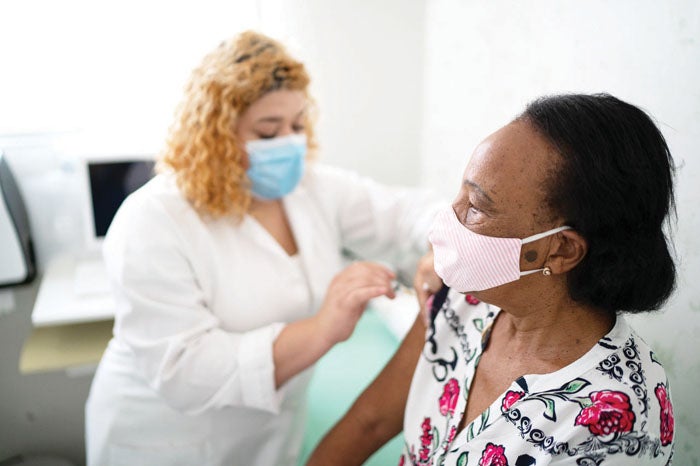What to do – and not to do – when you receive the COVID-19 vaccine
Published 12:32 am Tuesday, January 26, 2021
|
Getting your Trinity Audio player ready...
|
Why wearing a mask is still important
By Gina DiPietro
Novant Health
As the COVID-19 vaccine becomes available to more people, it’s important to remember to continue to social distance and wear a mask — even if you’ve been vaccinated.
To help answer some of today’s most pressing questions about the COVID-19 vaccine, Novant Health’s Dr. Genevieve Brauning shared some helpful do’s and don’ts.
Do continue to social distance
We do know that you can carry and transmit the virus — even if you’ve been vaccinated. You may not feel sick or have symptoms, but you can still be an asymptomatic carrier. Because of that, you could be a risk to other people who aren’t vaccinated. This is why we continue to ask people to social distance and avoid indoor crowds.
In addition to possibly being a carrier, there is still about a 5% chance a vaccinated person could contract COVID-19. If the incidence of disease is high enough, which we’re seeing with COVID-19, that 5% could add up to a lot of people.
Do continue to wear a mask
Most vaccines that protect people from viral illnesses also reduce transmission of the virus that causes the disease. While we hope this will be the case with the COVID-19 vaccines, the scientific community does not yet know if they will reduce such transmission. Because of this, we must continue to wear a face covering. Novant Health will continue to follow universal masking in all medical clinics and hospitals even after team members and patients receive the vaccine. And if you’re in a group that allows you to receive the vaccine ahead of others, be sensitive to the fact that others still have to wait.
Do get both doses of the COVID-19 vaccine
Getting only one dose of the vaccine is about 50% effective, so it’s important to get both doses to be better protected. Keep in mind that it takes two weeks after the second dose to reach 95% efficacy.
Also, if you receive the first dose, you have the advantage of being reserved a spot for a second dose and that’s a luxury. People are clamoring for those spots. So, if you’re going to embark on this process of getting vaccinated against COVID-19, let’s go ahead and do it the right way.
Do anticipate side effects
Expected effects after receiving the vaccine include low-grade fever, chills, fatigue, headache and pain or swelling in the arm where you got the shot. It may feel like the flu or even affect your ability to do daily activities, but the effects are short-lived and, most importantly, normal signs the body is building protection to the virus. You cannot get COVID-19 from the vaccine.
Some say the anticipated effects are more robust after receiving the second dose. Just know it’s not something to be scared of. The Centers for Disease Control and Prevention (CDC) recommends taking ibuprofen or acetaminophen to reduce pain or discomfort.
Do exercise caution when you travel
One of my concerns with traveling has been that it’s highly likely for you to catch something because you’re around so many different people in an airport or an airplane. However, once you’ve received both COVID-19 vaccines, you’re pretty well protected and you can feel safer about traveling. Even so, people are still encouraged to practice social distancing as best they can, while also wearing a mask anytime they are not eating or drinking.
Do not take acetaminophen prior to vaccination
If you experience arm soreness, chills or a headache, experts recommend taking acetaminophen or NSAIDs to alleviate symptoms. However, taking these medications prior to vaccination (in order to prevent post-vaccination symptoms) is not currently recommended, as it’s not yet known if it could interfere with the vaccine-induced antibody responses.
Do not leave immediately after receiving the vaccine
It is recommended that people wait 15 minutes before leaving the vaccination site — just to be certain that there is not an allergic reaction. While a reaction is rare, it’s important to wait for a short period of time while there is medical supervision. Those who have a history of adverse reactions to injections are advised to wait 30 minutes instead of 15 minutes. Patients should also tell their provider if they’ve had a bad reaction to an injection in the past.
Do not wear restrictive clothing
Similar to the flu shot, the COVID-19 vaccine is administered in the upper arm. Wear loose clothing to avoid removing clothing, as other people will be receiving the vaccine in the same room.
Do not hug loved ones, unless everyone has been vaccinated
If both parties are vaccinated, the transmission rate is going to be really low. It’s not impossible to share infection, but your risk is significantly lower. If both people are not vaccinated, it’s important to wear a mask if you’re going to be close to a friend or family member that you do not live with. It’s also important to wear a mask since there is a slight chance you could be an asymptomatic carrier.
Do not get health information from untrusted sources
People need to be really mindful about reading or sharing misinformation. I encourage people to do their homework and use scientific sources for information, such as the CDC or a county health department. You can also consult your doctor.
Do not delay other vaccinations or medications
The recommendation right now is not to make any medication adjustments for the vaccine. Don’t let your medicines interfere with you scheduling the vaccine when it’s available to you. If you do need to receive another vaccine, such as the shingles vaccine or a tetanus shot, just be mindful to separate the shots by at least two weeks.



